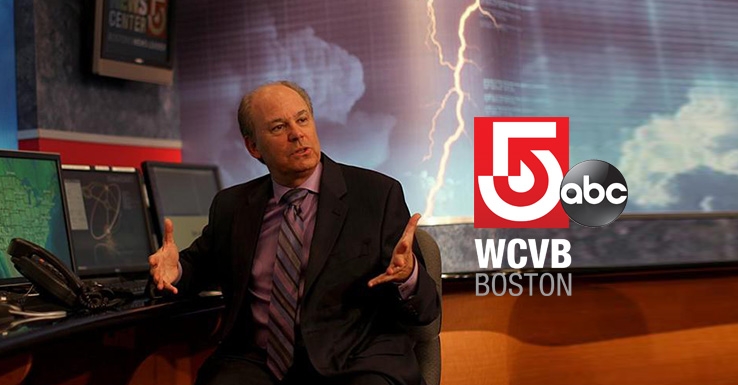Harvey Leonard enters the empty, dimly lit studio on a recent early afternoon, flips on some lights, and takes a seat at a computer used for creating graphics on a weather map.
WCVB-TV’s chief meteorologist begins checking weather models, radar information, and e-mails from weather watchers and the National Weather Service. He sorts through notes left from earlier shifts in preparation for his 5 p.m. forecast. “We leave each other notes about our thoughts based on our own research,’’ he says. “It’s helpful.”
Marking his 40th year in the business, Leonard admits to a lifelong obsession with weather. “I am just fascinated by weather patterns, the way they’re always changing, the challenge of analyzing it all,” he says.
Right now he is checking the radar to track a possible nor’easter. He zooms in. The absence of colors on the screen indicate nothing is happening in the area. He scrolls out and red, orange, and green colors emerge, showing meteorological activity in the distance.
Sometimes whistling as he moves graphics around a computerized map, he recalls the changes he’s seen. “Thirty to forty years ago there weren’t as many computer models and what we did have was not as sophisticated,” he explains. “We had radar and satellite data, but it’s all greatly improved now.”
Leonard, 65, says his fascination took hold early. “When I was about 5, my parents thought I was odd. I was so into the weather they’d say ‘We don’t know what’s wrong with him.’ I couldn’t sleep when there was the threat of a storm, and I had trouble focusing on school.”
His parents bought him his first weather book when he was 8 or 9. “That nurtured my interests and my love of the science of weather really flourished.”
But Leonard felt alone in his fixation. “It was difficult because I didn’t know anyone else who had as intense an interest. I was still really into sports; I had a lot of friends, and I liked girls, but I just really liked weather. I was so in tune to it I could tell by looking up at the sun what time it was within 20 minutes.”
As intrigued as he was, he didn’t plan to study meteorology in college. Growing up in the Bronx, Leonard was 16 when he graduated from high school. After entering the City College of New York he took engineering and math classes. Then one day he thumbed through a friend’s meteorology textbook and was hooked. “By changing majors, everything changed with me,’’ he recalls. “My motivation level went straight up.” Leonard eventually earned his bachelor’s degree in meteorology and a master’s from New York University.
Back in the studio after meetings with news writers, Leonard recorded a promo to precede the news.
Studying more graphics, he rehearses his forecast in front of the chroma key, a neon-green backdrop where “the magic happens,” Leonard says. “Years ago we could only predict weather 48 hours out. Then we dared to forecast five days out. Now with improvements in radar, we’re doing seven days with relative confidence.’’
The chroma key is part of a digital process that emerged in the 1980s. It allows weather maps to appear behind Leonard as he delivers his forecast. While it was a vast improvement over the maps and magnetic stick-ons of yore, it caused some anxiety. “At first I was nervous because you’re pointing to nothing,’’ he says. “But all meteorologists had to learn how to adjust to it.”
Nerves were all too familiar to Leonard, who struggled with them early in his career. “I was offered my first TV job at WPRI [in Providence] in 1974 after working in radio. I actually felt bad for the station because they didn’t realize they were getting a real basket case,” he says. “I watched my first broadcast, and I was like a robot. I had to prove to myself that I could do it. WPRI anchor Walter Cryan helped loosen me up by saying funny things and setting up exchanges that made me more relaxed.’’
These days the one thing that causes the veteran meteorologist angst are changes in weather patterns so late in the process that there’s no time to update the graphics. But being honest about the forecast even if the graphics don’t always match is the most important part in delivering the weather, he says.
But what if the weather patterns appear uncertain?
Nate Silver, statistician and sports and political blogger, says in that situation many meteorologists err on the side of a more pessimistic forecast. Viewers tend to complain less if they are surprised by good weather than by bad.
Leonard says he resorts to that only “when I am truly on the fence.” He prefers to lay out scenarios and let the audience know “which way I am leaning. This way, viewers will not only understand the conclusion I reached, but they also understand what went wrong in case my forecast is off.”
Forecasting is part of his daily routine, says Leonard, who joined WCVB in 2002 after 25 years at WHDH-TV. The father of two daughters and grandfather of three checks the weather at his Natick home, logging in each morning after rising.
“I am a weather geek,” he admits. “I am definitely a winter weather geek. It really does take control of me. I like the challenge of predicting winter storms.”
Leonard says Lorraine, his wife of 39 years, understands this. “In early December of 2003, we were vacationing in the Caribbean. I checked the weather before we left and didn’t see any big problems.’’ Then a few days into the trip, he saw a big storm developing back home.
“I went back to the beach and my wife said, ‘What’s wrong? You look like you’ve seen a ghost!’ I told her New England was going to get clobbered with a major nor’easter and possibly a blizzard. She knew I would be useless to her and wouldn’t enjoy myself, so she sent me back home to work!’’
For many in the industry, Leonard became a teacher and a mentor. Lee Goldberg, chief meteorologist at WABC-TV in New York, said interning under Leonard at WHDH-TV was a highlight of his college summers. “Harv became my ultimate mentor — a career and life teacher, and even a second dad. I learned from him the formula for longevity — to be consistent, thorough, honest, credible, and be trusted — just be a good guy.”
And after all the years, Leonard still looks forward to his work. “I love it because it’s always new,” he says. Just then the producer gives him a two-minute warning to air time. Leonard tweaks his weather graphics one final time, puts on his jacket and microphone, and with a smile, takes his place in front of the magic screen.
from Christie Coombs of The Boston Globe




